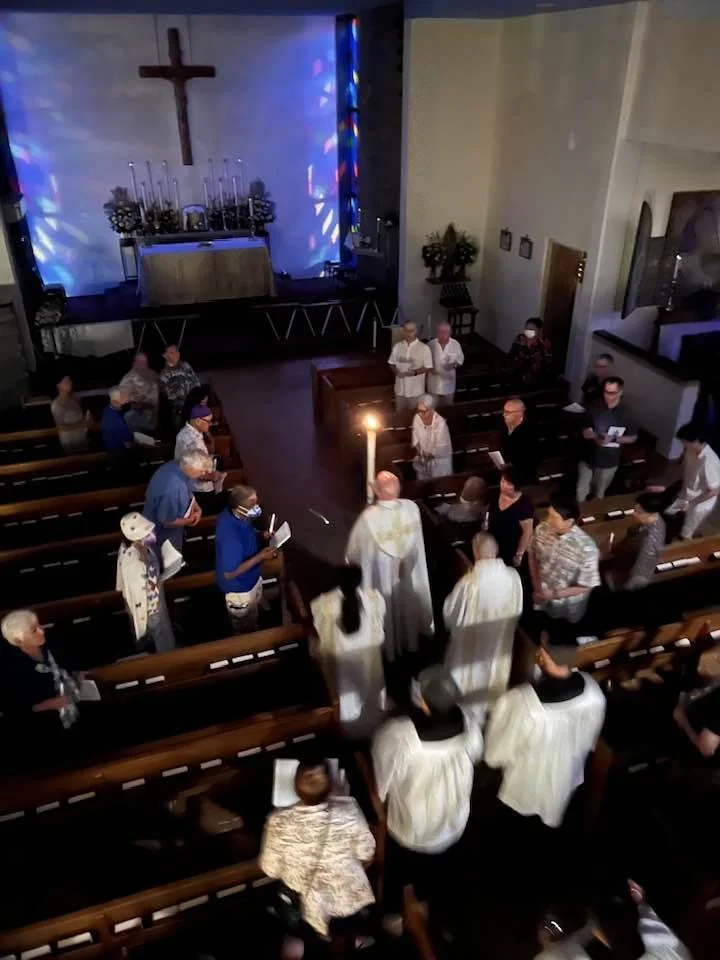From the Rector: Lenten Disciplines
/Last Sunday in the sermon I mentioned that three of the great practices of Lent are prayer, fasting and alms-giving. All three have their merits, and in many ways they are necessary for a fruitful Christian life no matter what the season of the year. Of the three, perhaps fasting is the most misunderstood by people.
Ash Wednesday and Good Friday are the two great fast and abstinence days of the year, and Fridays, as memorials of the crucifixion, are also a time when abstinence is practiced. Many Christians practice fasting and abstinence all throughout Lent as well. Fasting is the reduction of an item such as eating less food on Good Friday; abstinence is the giving up of an item, such as forsaking red meat on Fridays. Food is not the only thing for which fasting and abstinence apply. You might decide to lessen your time on Facebook and Twitter this Lent, a form of fasting, or you might give up such social networking entirely, a form of abstinence.
In our modern society one of the most convincing reasons for such disciplines is that we live in a world of extreme materialism and consumption. It is healthy to give up certain things if we are to discipline our lives. This is not a popular sentiment, but it is becoming more and more necessary for an authentic Christian life. Whereas the world often teaches instant gratification and over-indulgence, fasting and abstinence can help re-orient us to God, teaching patience and steadfastness. We learn to direct all our yearning to God. Fasting and abstinence are also a way to show solidarity with the poor and the hungry. We realize how comfortable we are when we have trouble fasting one day. Take some time and think about those who have little food for an entire week. In this case, fasting and abstinence may teach us generosity and compassion, and action often begins with a desire to be generous and compassionate.
However, as in all things in life, discretion is always advised. For instance, abstaining from red meat on Fridays by enjoying succulent and gourmet fish dishes misses the point. As well, if your fast makes you grumpy and irritable, you will be doing no one any favors. The world does not need more morose Christians. The key, amidst the irritability, is to self-reflect or to know yourself, and to turn the irritation into a joyful longing for God. Such is what makes true discipleship.
At one of my previous parishes, the young adult group decided to go vegan one Lent. It worked well for it required them to be super-intentional about all of their meals. They could not do things by rote - everything had to be thought through. Every bite was in the context of their Lenten disciplines. It was also a great lesson about food production - something which we comfortable Episcopalians often do not understand. They discovered everything they needed to know about food labels. This led them to research some of the ingredients listed on the labels, as well as how the food was produced. In a few cases they became aware of injustices for which they had been ignorant before. Their fasting and abstinence helped them honor their baptismal promises in a new way, taking action in a small way as informed consumers.
Fasting and abstinence are not only about food. We may fast from television, or we may abstain from jealousy and anger. Maybe a fast from working long hours is necessary? Maybe we need to abstain from being suspicious of others? Maybe we need to give up a stubborn attitude toward our spouse which is miring a relationship? Such questions raise a key point. We practice fasting and abstinence in order to realize a more joyful and positive goal. We give up food to honor the hungry. We give up anger to let love come into a relationship. We forsake jealousy so that trust might enter the equation. We disown injustice so that the promises of our baptismal covenant might become a reality. Ultimately fasting and abstinence, along with prayer and alms-giving, are about the transformation of our hearts and minds to become more of the people God wishes us to be.

Some of you have mentioned that you would like some Lenten reading suggestions. This Lent I am reading The Ignatian Workout for Lent: 40 Days of Prayer, Reflection and Action by Tim Muldoon. The book contains 40 exercises, one for each day of Lent, and each exercise consists of a prayer and some action to take. For me the value of the book is the examination of one's conscience. Drawing on Ignatian spirituality, the book aims to help the reader discover the truest desires of life. How might we discover God's love in a world full of distractions? What distractions do we need to shed to be focused on God?
Lent is here to help us give up the distractions that keep us removed from God. More than just an exercise in saying a few rote Hail Marys or giving up chocolates, Lent is here for the examining of our consciences whether we are praying, fasting or giving alms. May we be willing to do such soul-searching with expectant hearts.
Father Paul Lillie+







